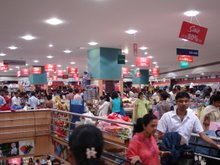Wal-Mart’s Japan unit posts fifth year of loss. Tough times ahead for global retailers.
 ALMOST five years since Wal-Mart Stores landed in Japan, the world’s largest retailer has yet to find itself on steady ground. Its 53% - owned local unit Seiyu has posted five straight years of losses, has not paid a dividend for a decade, and has lost three quarters of its stock market value since Wal-Mart first invested in the Japanese supermarket chain. The US retailer quit South Korea and Germany last year to focus on China and other promising areas, prompting speculation that it would also desert Japan in the manner of France’s Carrefour, which sold its stores to Aeon in 2005. Some analysts say Wal-Mart should either give up on Japan, where it has invested a total of more than $1 billion, or buy the whole of Seiyu to speed up an overhaul. Others say Japan’s $1.1 trillion retail market — the world’s second largest after the United States — is too big to pass up for Wal-Mart’s international expansion dream. “I believe that Wal-Mart believes they’re in Japan for the long haul and right now, that looks like the right bet,” said Darrell Rigby, head of the global retail practice at consultants Bain & Co. While the Wal-Mart chain is yet to get a steady footing in Japan, there seems to be crisis raging in the Carrefour group. A major stake-holder, the Halley family, is reassessing its holding in the retail chain. There is a possibility of a sale of the Halley holding.
ALMOST five years since Wal-Mart Stores landed in Japan, the world’s largest retailer has yet to find itself on steady ground. Its 53% - owned local unit Seiyu has posted five straight years of losses, has not paid a dividend for a decade, and has lost three quarters of its stock market value since Wal-Mart first invested in the Japanese supermarket chain. The US retailer quit South Korea and Germany last year to focus on China and other promising areas, prompting speculation that it would also desert Japan in the manner of France’s Carrefour, which sold its stores to Aeon in 2005. Some analysts say Wal-Mart should either give up on Japan, where it has invested a total of more than $1 billion, or buy the whole of Seiyu to speed up an overhaul. Others say Japan’s $1.1 trillion retail market — the world’s second largest after the United States — is too big to pass up for Wal-Mart’s international expansion dream. “I believe that Wal-Mart believes they’re in Japan for the long haul and right now, that looks like the right bet,” said Darrell Rigby, head of the global retail practice at consultants Bain & Co. While the Wal-Mart chain is yet to get a steady footing in Japan, there seems to be crisis raging in the Carrefour group. A major stake-holder, the Halley family, is reassessing its holding in the retail chain. There is a possibility of a sale of the Halley holding.

No comments:
Post a Comment